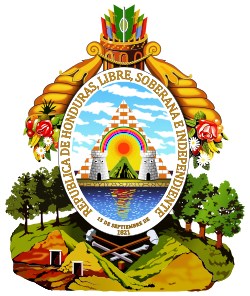You can help expand this article with text translated from the corresponding article in Spanish. (November 2013)Click [show] for important translation instructions.
|
 |
|---|

The National Electoral Council (Spanish : Consejo Nacional Electoral) is the highest electoral authority, both at the administrative and jurisdictional level in the Republic of Honduras. It was created through constitutional reforms in January 2019, supplanting the previous Supreme Electoral Tribunal (Spanish : Tribunal Supremo Electoral).
Contents
The Council alongside the Electoral Justice Tribunal (Spanish : Tribunal de Justicia Electoral) deal with everything related to electoral acts and procedures. Integration, organization and operation are governed by the precepts of the Constitution of Honduras and the Electoral and Political Organizations. [1]